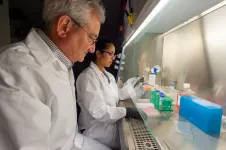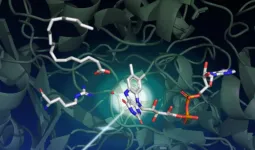MERS DNA vaccine induces immunity, protects from virus challenge in preclinical model
Dose-sparing regimens and intradermal delivery have important implication for rapid clinical development of effective, well-tolerated and easy-to-distribute vaccines against MERS and other emerging coronaviruses.
2021-04-22
(Press-News.org) PHILADELPHIA -- (April 22, 2021) -- A synthetic DNA vaccine candidate for Middle East respiratory syndrome coronavirus (MERS-CoV) developed at The Wistar Institute induced potent immune responses and afforded protective efficacy in non-human primate (NHP) models when given intradermally in abbreviated, low-dose immunization regimen. A similar vaccine candidate was previously shown to be safe and tolerable with a three-dose intramuscular injection regimen in a recently completed human phase 1 study and is currently in expanded studies of phase 1/2a trial.
New results were published today in JCI Insight.
"While several vaccine products are being advanced against MERS and other coronaviruses, low-dose delivery and shortened regimes are crucial to rapidly induce protective immunity, particularly during emerging outbreaks, as the current SARS-CoV-2 pandemic has emphasized," said David B. Weiner, Ph.D., Wistar executive vice president, director of the Vaccine & Immunotherapy Center (VIC) and W.W. Smith Charitable Trust Professor in Cancer Research, who led the study.
Researchers evaluated the immunogenicity and protective efficacy of their MERS synthetic vaccine when delivered intradermally using a shortened two-dose immunization schedule compared with intramuscular delivery of higher doses in NHP.
"Given that human efficacy trials for MERS vaccines may be challenging due to the low number of yearly cases, animal models such as our NHP model are valuable as a bridge with human data coming from early-phase clinical trials," said Weiner.
In this study, Weiner and team report robust antibody neutralizing antibodies and cellular immune responses in all conditions tested. A rigorous virus challenge experiment showed that all vaccination groups were protected against MERS-CoV compared to unvaccinated control animals. However, the low-dose regimen with intradermal delivery was more impactful in controlling disease and symptoms than the higher dose delivered intramuscularly in NHP models.
"To our knowledge, this is the first demonstration of protection with an intradermally delivered coronavirus vaccine," said Ami Patel, Ph.D., Caspar Wistar Fellow at the Vaccine & Immunotherapy Center and one of the lead authors of the paper. "Intradermal delivery of synthetic DNA vaccines has significant advantages for rapid clinical development. It can be dose sparing and has higher tolerability in people compared with intramuscular injection. The positive results of this study are important not only for the advancement of this MERS vaccine but also for development of other vaccines."
"Our team is also advancing a COVID-19 vaccine through clinical trials, and we were able to do so in a very short time thanks to our previous experience developing the MERS vaccine," added Weiner.
Importantly, no evidence of adverse effects on the lungs was observed in any of the dosing groups compared to unimmunized control animals. Through the assessment of a large panel of blood cytokines, researchers showed significant decrease in all mediators of inflammation, which further suggests the vaccine prevents the destructive inflammation induced by coronaviruses.
"In the past twenty years, three new coronaviruses have emerged and caused human outbreaks. The current SARS-CoV-2 pandemic has further emphasized the importance of rapid infection control for coronaviruses and other emerging infectious diseases," said Emma L. Reuschel, Ph.D., a staff scientist in the Weiner lab and co-first author on the study. "Vaccine candidates that are simple to deliver, well tolerated, and can be readily deployed in resource-limited settings will be important to achieve control of infection."
INFORMATION:
Co-authors: Ziyang Xu, Faraz I. Zaidi, Kevin Y. Kim, Regina Stoltz, and Kar Muthumani from The Wistar Institute; Dana P. Scott, Friederike Feldmann, Tina Thomas, Rebecca Rosenke, Dan Long, Jamie Lovaglio, Patrick W. Hanley, and Greg Saturday from National Institutes of Allergy and Infectious Diseases, National Institutes of Health, Hamilton, MT; Janess Mendoza, Stephanie Ramos, Laurent Humeau, and Kate E. Broderick from INOVIO Pharmaceuticals, Inc.
Work supported by: Funding from the Intramural Research Program, National Institutes of Allergy and Infectious Diseases, and the Coalition for Epidemic Preparedness Innovations (CEPI).
Publication information: Intradermal delivery of a synthetic DNA vaccine protects macaques from Middle East respiratory syndrome coronavirus, JCI Insight (2021). Online publication.
The Wistar Institute is an international leader in biomedical research with special expertise in cancer research and vaccine development. Founded in 1892 as the first independent nonprofit biomedical research institute in the United States, Wistar has held the prestigious Cancer Center designation from the National Cancer Institute since 1972. The Institute works actively to ensure that research advances move from the laboratory to the clinic as quickly as possible. wistar.org.
[Attachments] See images for this press release:

ELSE PRESS RELEASES FROM THIS DATE:
2021-04-22
Although many organisms capture and respond to sunlight, enzymes - proteins that catalyze biochemical reactions - are rarely driven by light. Scientists have identified only three types of natural photoenzymes so far. The newest one, discovered in 2017, is fatty acid photodecarboxylase (FAP). Derived from microscopic algae, it uses blue light to catalyze the conversion of fatty acids, found in fats and oils, into alkanes and alkenes.
"A growing number of labs envision using FAPs for green chemistry applications, because alkanes and alkenes are important components of solvents and fuels, including gasoline ...
2021-04-22
For reasons not yet clear, pregnant women infected with the virus that causes COVID-19 are more likely to experience preterm births, pre-eclampsia, and other neonatal problems than non-infected women.
A team of Yale scientists decided to investigate whether the virus could be affecting placental tissue of infected expectant mothers. Their analysis found that while evidence of the virus in the placenta is rare, the placenta in infected mothers tended to exhibit a much higher level of immune system activity than those of non-infected pregnant women, they report April 22 in the journal Med.
"The good news is the placenta is mounting a robust defense against an infection that is far distant, in lungs or nasal tissue," said Shelli Farhadian, assistant professor of internal ...
2021-04-22
April 22, 2021--(BRONX, NY)--Researchers at Albert Einstein College of Medicine have designed an experimental drug that reversed key symptoms of Alzheimer's disease in mice. The drug works by reinvigorating a cellular cleaning mechanism that gets rid of unwanted proteins by digesting and recycling them. The study was published online today in the journal Cell.
"Discoveries in mice don't always translate to humans, especially in Alzheimer's disease," said co-study leader Ana Maria Cuervo, M.D., Ph.D., the Robert and Renée Belfer Chair for the Study of Neurodegenerative Diseases, professor of developmental and molecular biology, ...
2021-04-22
Soldiers, athletes, and motorists could lead safer lives thanks to a new process that could lead to more efficient and re-useable protection from shock and impact, explosion, and vibration, according to a new study.
Pressurised insertion of aqueous solutions into water-repellent nanoporous materials, such as zeolites and metal-organic frameworks, could help to create high-performance energy absorbing systems.
An international research team experimented with hydrothermally stable zeolitic imidazolate frameworks (ZIFs) with a 'hydrophobic' cage-like molecular structure - finding that such systems are remarkably effective energy absorbers at realistic, high-rate loading conditions, ...
2021-04-22
As politics grows increasingly polarized, a new global study finds people often exaggerate political differences and negative feelings of those on the opposite side of the political divide, and this misperception can be reduced by informing them of the other side's true feelings. The study replicates earlier research in the United States, finding the phenomenon to be generalizable across 25 countries.
The new study was led by Kai Ruggeri, PhD, assistant professor of health policy and management at Columbia University Mailman School of Public Health, and replicates a 2020 study by Jeffrey Lees and Mina Cikara at Harvard University, who were also co-authors of the new study. The new findings ...
2021-04-22
Stars spin faster than expected as they age according to a new study led by scientists at the University of Birmingham which uses asteroseismology to shed new light on this emerging theory.
All stars, like the Sun, are born spinning. As they grow older, their spin slows down due to magnetic winds in a process called 'magnetic braking'. Research published in 2016 by scientists at Carnegie Observatories delivered the first hints that stars at a similar stage of life as the Sun were spinning faster than magnetic braking theories predicted. The results from this study were based on a method in which scientists pinpoint ...
2021-04-22
What The Study Did: This case series reports the risk factors, incidence rate and features of acute ischemic stroke experienced by a group of male patients ages 50 years or younger in the convalescent stage of COVID-19.
Authors: Tian Ming Tu, M.R.C.P., of the National Neuroscience Institute in Singapore, is the corresponding author.
To access the embargoed study: Visit our For The Media website at this link https://media.jamanetwork.com/
(doi:10.1001/jamanetworkopen.2021.7498)
Editor's Note: The article includes conflict of interest disclosures. Please see the article for additional information, including other authors, ...
2021-04-22
What The Study Did: This study assesses the association between COVID-19 and maternal and neonatal outcomes in pregnant women with COVID-19 diagnosis compared with pregnant women without COVID-19 diagnosis.
Authors: Aris T.Papageorghiou, M.D., of the University of Oxford in the United Kingdom, is the corresponding author.
To access the embargoed study: Visit our For The Media website at this link https://media.jamanetwork.com/
(doi:10.1001/jamapediatrics.2021.1050)
Editor's Note: The article includes conflict of interest and funding/support disclosures. Please see the article for additional information, including ...
2021-04-22
What The Study Did: This cohort study examines viral dynamics and transmission of infection for NBA players, staff and vendors who had clinically recovered from SARS-CoV-2 infection but continued to have positive test results following discontinuation of isolation precautions.
Authors: Christina Mack, Ph.D., M.S.P.H., of IQVIA, Real World Solutions, in Durham, North Carolina, is the corresponding author.
To access the embargoed study: Visit our For The Media website at this link https://media.jamanetwork.com/
(doi:10.1001/jamainternmed.2021.2114)
Editor's ...
2021-04-22
What The Study Did: This review of 125 U.S.-based clinical trials that investigated the management of hearing loss assessed representation in the trials by race/ethnicity and sex.
Authors: Carrie Nieman M.D., M.P.H., of the Johns Hopkins University Bloomberg School of Public Health in Baltimore, is the corresponding author.
To access the embargoed study: Visit our For The Media website at this link https://media.jamanetwork.com/
(doi:10.1001/jamaoto.2021.0550)
Editor's Note: The article includes conflicts of interest and funding/support disclosures. Please see the article for additional ...
LAST 30 PRESS RELEASES:
[Press-News.org] MERS DNA vaccine induces immunity, protects from virus challenge in preclinical model
Dose-sparing regimens and intradermal delivery have important implication for rapid clinical development of effective, well-tolerated and easy-to-distribute vaccines against MERS and other emerging coronaviruses.



